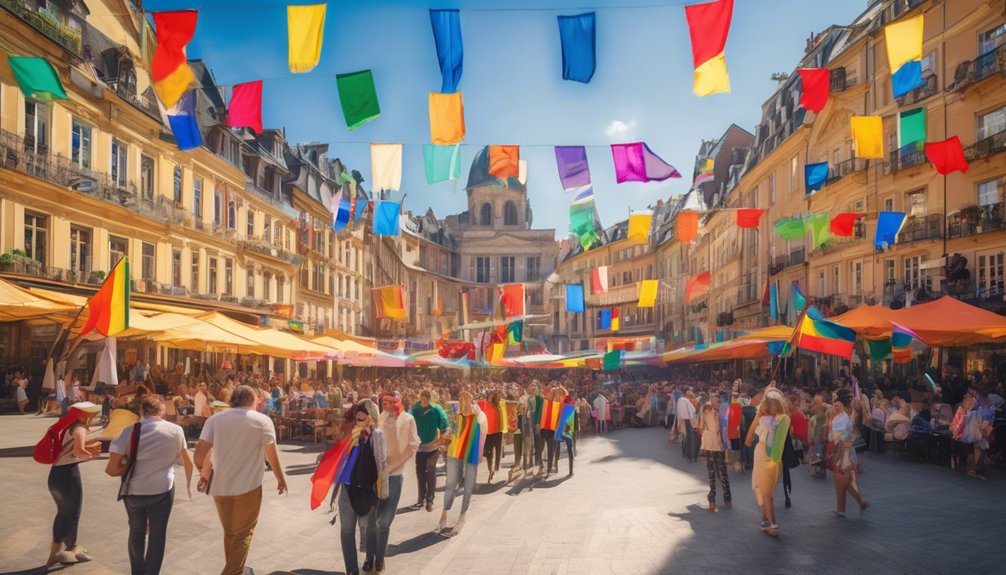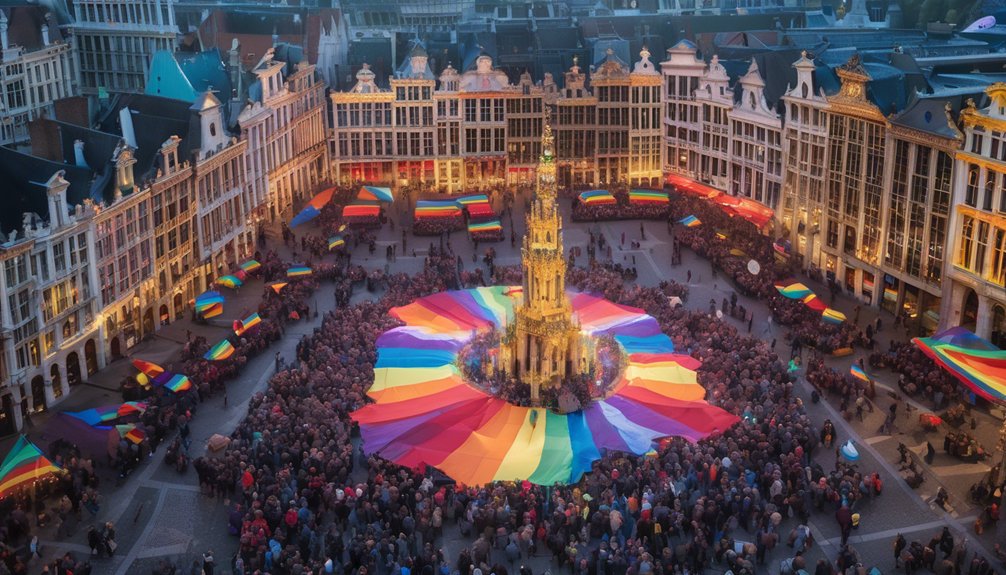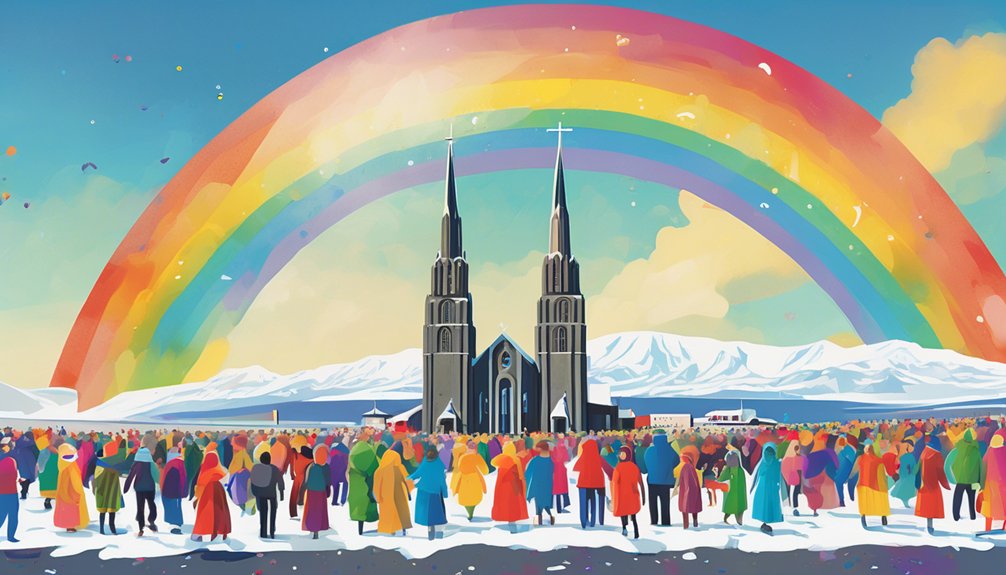Rainbow Ranking: The Most LGBTQ+ Welcoming Nations in Europe 2025


Table of Contents
ToggleIn the 2025 Rainbow Ranking, you’ll find that Malta leads as Europe’s most LGBTQ+-friendly country, maintaining its position for a decade with an impressive score of 88.83%. Meanwhile, Belgium and Iceland aren’t far behind, showcasing notable legal strides and societal backing. Denmark and Spain also rank highly, emphasizing inclusivity and cultural acceptance. Yet, this isn’t just about numbers. There’s more beneath the surface that reveals the true state of LGBTQ+ rights and acceptance across these nations.
Even though many countries have made strides in LGBTQ+ rights, Malta stands out as a leader, consistently recognized for its progressive policies and inclusive environment. As Europe’s most LGBTQ+-friendly country for the tenth consecutive year, Malta’s 88.83 percent score on the Rainbow Map 2025 highlights its dedication to LGBTQ rights. The nation excels in legal gender recognition and civil society space, earning perfect scores in these crucial areas. Malta’s pioneering decision to ban conversion therapy and legalize same-sex marriage in 2017 reflects its proactive approach. Despite these achievements, challenges remain, particularly in improving intersex bodily integrity. With 62% of LGBTI individuals feeling comfortable disclosing their orientation, Malta continues to foster a supportive environment, yet vigilance against discrimination is vital.

With a steadfast commitment to equality, Belgium has emerged as a leading nation for LGBTQ+ rights in Europe, securing an impressive 85.31% on the 2025 Rainbow Map. Belgium’s perfect scores in Hate Crime & Hate Speech and Civil Society Space highlight its robust legal frameworks and supportive environment. By equating discrimination based on sexual orientation with racial discrimination in its Criminal Code, Belgium bolsters protections for the LGBTQ+ community. However, challenges remain, particularly regarding Intersex Bodily Integrity, indicating a need for continued progress. Despite these hurdles, Belgium’s active advocacy and legal reforms underscore its ongoing commitment to equality. These efforts demonstrate how the nation remains at the forefront of advancing LGBTQ+ rights and protections in Europe.

Despite its small size, Iceland has made significant strides in promoting LGBTQ+ rights, ranking third on the 2025 Rainbow Map with an impressive score of 84.06%. You’ll notice Iceland’s legal advancements, such as achieving a perfect score in Legal Gender Recognition, allowing seamless gender changes without significant barriers. The country’s ban on conversion therapy, effective January 1st, 2024, underscores its commitment to equal rights and inclusivity. Social acceptance is high, as most Icelanders support LGBTQ+ equality, reinforcing the nation’s progressive stance. Reykjavík Pride, a vibrant annual event, further highlights this inclusivity with parades, concerts, and educational programs, celebrating and supporting LGBTQ+ rights. Iceland’s proactive measures and social support make it a leading example in Europe.
Following Iceland’s impressive commitment to LGBTQ+ rights, Denmark stands out as another guiding light of inclusivity and advocacy in Europe. Ranking fourth in the Rainbow Map 2025 with a score of 80.10%, Denmark exemplifies a dedication to LGBTQ+ rights through robust policies and community initiatives. Key strengths include:
While Spain’s vibrant cultural tapestry weaves inclusivity into its societal fabric, its legislative efforts further cement its role as a leader in LGBTQ+ rights in Europe. Ranking fifth on the ILGA-Europe Rainbow Map 2025 with a score of 77.97%, Spain’s commitment is evident through its groundbreaking legalization of same-sex marriage in 2005 and the subsequent adoption rights for same-sex couples. The Ley Trans law, which allows self-identification for legal gender change, underscores Spain’s advancements in trans rights. However, challenges persist, particularly with notable hate crimes against LGBTQ+ individuals. Despite this, social acceptance remains robust, with 91% of Spaniards supporting equal rights, highlighting a cultural acceptance that solidifies Spain’s progressive stance on LGBTQ+ issues.
When wondering about the most LGBTQ+-friendly country in Europe, think Malta. Marvelously progressive, Malta magnificently melds LGBTQ+ rights with cultural acceptance. Pride events flourish, supported by strong legal protections and social inclusion. Community support thrives, rooted in historical context and activism efforts. They’ve tackled representation issues and improved health services, creating an all-encompassing haven. You’ll find Malta’s dedication to diversity delightful, offering insight into a society where everyone enjoys equal rights and respect.
When you consider the LGBTQ capital of Europe, think about the vibrant LGBTQ Pride events, diverse European festivals, and cultural acceptance that cities like Amsterdam or Berlin offer. These cities have demonstrated historical progress with strong legal rights and community support. Educational programs and health services guarantee social integration and travel safety. Their commitment to inclusivity makes them top contenders, reflecting the broader expedition towards equality and acceptance across the continent.
If you’re seeking somewhere that feels like a warm hug, consider locations offering robust LGBTQ+ rights, cultural acceptance, and safe spaces. Prioritize places with strong legal protections and vibrant community support. Look for healthcare access, social integration, and where representation matters. Historical progress often indicates welcoming environments. Your travel experiences will be enriched in places where diversity thrives, ensuring you feel part of the fabric rather than a visitor.
You may be curious which country hosts the largest LGBTQ population. While precise LGBTQ population statistics can be elusive due to varying historical gay rights and cultural acceptance trends, the influence of LGBTQ activism, media representation, and strong legal protections typically enhances visibility. Countries with strong community support networks and educational resources often report larger populations. However, health disparities and intersectionality in queer spaces suggest a complex landscape beyond mere numbers.
You’ve seen how Malta, Belgium, Iceland, Denmark, and Spain have made remarkable strides in LGBTQ+ rights, but some might argue that challenges still persist. It’s true, no nation is perfect, but these countries are paving the way with their commitment to equality and inclusivity. They’re setting an example for others to follow, demonstrating that progress is possible. By focusing on both legal advancements and cultural acceptance, they’re creating spaces where everyone can live freely and authentically.
Originally posted 2025-05-18 20:40:41.
 News and AdvocacyNovember 14, 2025Rainbow Victories: 2025’s Most Pro-LGBTQ+ States Revealed
News and AdvocacyNovember 14, 2025Rainbow Victories: 2025’s Most Pro-LGBTQ+ States Revealed News and AdvocacyNovember 14, 2025Transgender Sanctuary States: Protecting Rights, Providing Hope
News and AdvocacyNovember 14, 2025Transgender Sanctuary States: Protecting Rights, Providing Hope Featured PostsNovember 13, 2025When Restroom Policing Backfires: The Hotel That Went Too Far
Featured PostsNovember 13, 2025When Restroom Policing Backfires: The Hotel That Went Too Far Featured PostsNovember 13, 2025Sex, Safety, and Seduction: A Trans Girl’s Guide to Hookups
Featured PostsNovember 13, 2025Sex, Safety, and Seduction: A Trans Girl’s Guide to Hookups